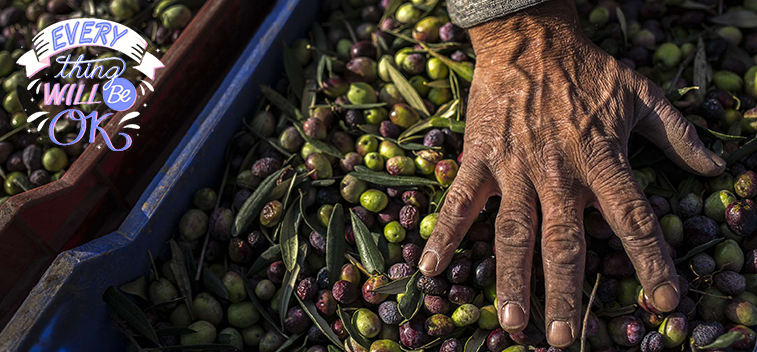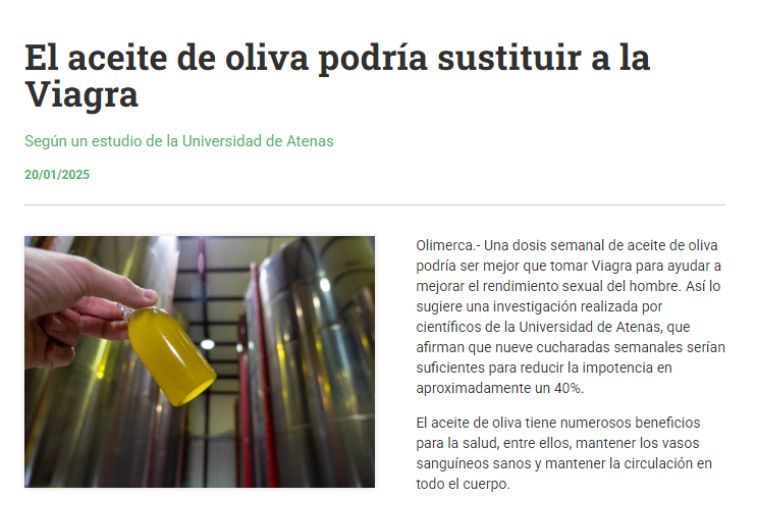The EC foresees a 20% increase in olive oil production for the 20/21 campaign

European olive oil production in the 2020/21 campaign could be around 2.3 million tons, 20% more than the previous season, thanks to the good weather conditions during the spring in Spain that would offset the impact of the heat waves in Greece and the lack of rain in certain Italian producing regions, according to the latest report on agricultural forecasts by the European Commission (EC) .
The Community Executive points out that during the spring, rainfall favored flowering in Spain and conditions have been good so far, so if they remain like this, another great harvest could be expected. Conversely, heat waves in Greece and lack of rain in the main producing regions of Italy are likely to add to an alternation of production; while Portugal is likely to maintain average growth, although probably at a lower rate than last year.
In its report, Brussels points out that the EU's olive oil production in the 2019/20 season remained below the five-year average (-4%). However, total availabilities (around 2.7 million tonnes) are close to those of last year when Spain, the main producer in the EU, recorded a record harvest.
The EC explains that there were positive signs pointing towards price stabilization earlier this year after the activation of private storage aid. However, Jaén's prices for virgin and extra virgin olive oil began to decrease again at the beginning of the COVID-19 crisis in March. Thus, in May, they stood at 170 euros / 100 kg. for the virgin category and at 196 euros / 100 kg. for extra virgin, so they remained significantly below the average of the last five years during the same period (-41% and -36%, respectively).
Consumption and exports
On the other hand, according to the Commission, an increase in consumption due to the COVID-19 measures led to an increase in retail sales of olive oil, particularly in the main producing countries of the EU, and in its use in the food industry (eg for canned goods). In non-producing countries in the EU, sales could probably decrease as a result of lower purchasing power. Overall, overall EU consumption could grow 6% in 2019/20.
For its part, EU exports continued to be very dynamic, growing 10% in volume, but decreasing 24% in value between October and March. Shipments remained high in all main destinations, and volume sales increased mainly to Brazil (+ 41%), Australia (+ 32%), Canada (+ 23%), Japan (+ 7%) and the United States ( + 3%).
In the specific case of exports to the United States, some of them were made in bulk, to be later packaged in the United States as a result of recent investments by Spanish companies in packaging facilities in the United States. And one part, according to the Commission, corresponded to Tunisian olive oil bottled in Spain and re-exported to the United States. Thus, between October and March, Community imports from Tunisia under the internal processing regime increased by 70% year-on-year. Furthermore, the EU is expected to continue importing olive oil, which is likely to reach 200,000 tonnes in September 2020.
Furthermore, global demand is expected to remain strong and, despite some possible slowdown in the near future due to storage in importing countries in previous months, EU exports could grow 6% to 750,000 tonnes .
The Commission believes that both Community and global demand should facilitate a reduction in stocks, which is likely to reach 609,000 tonnes in October 2020.
Source: Mercacei

 United States
(English)
United States
(English) Spanish
(Español)
Spanish
(Español) Chine
Chine


















